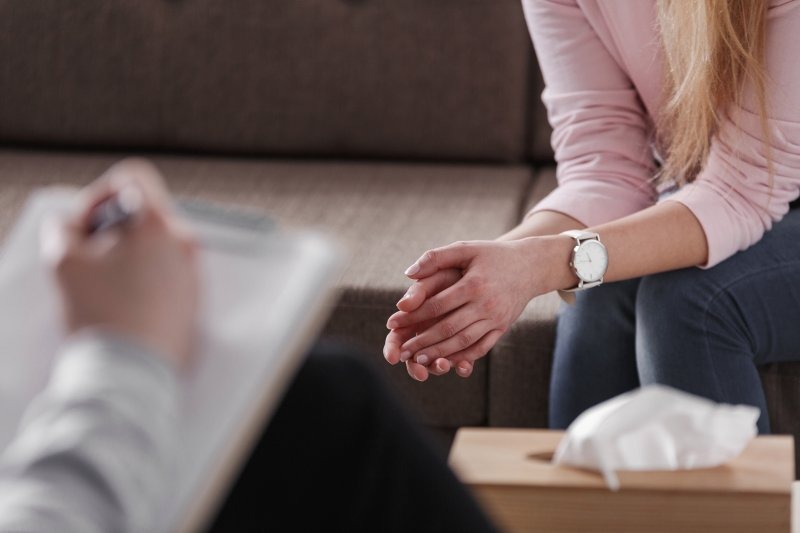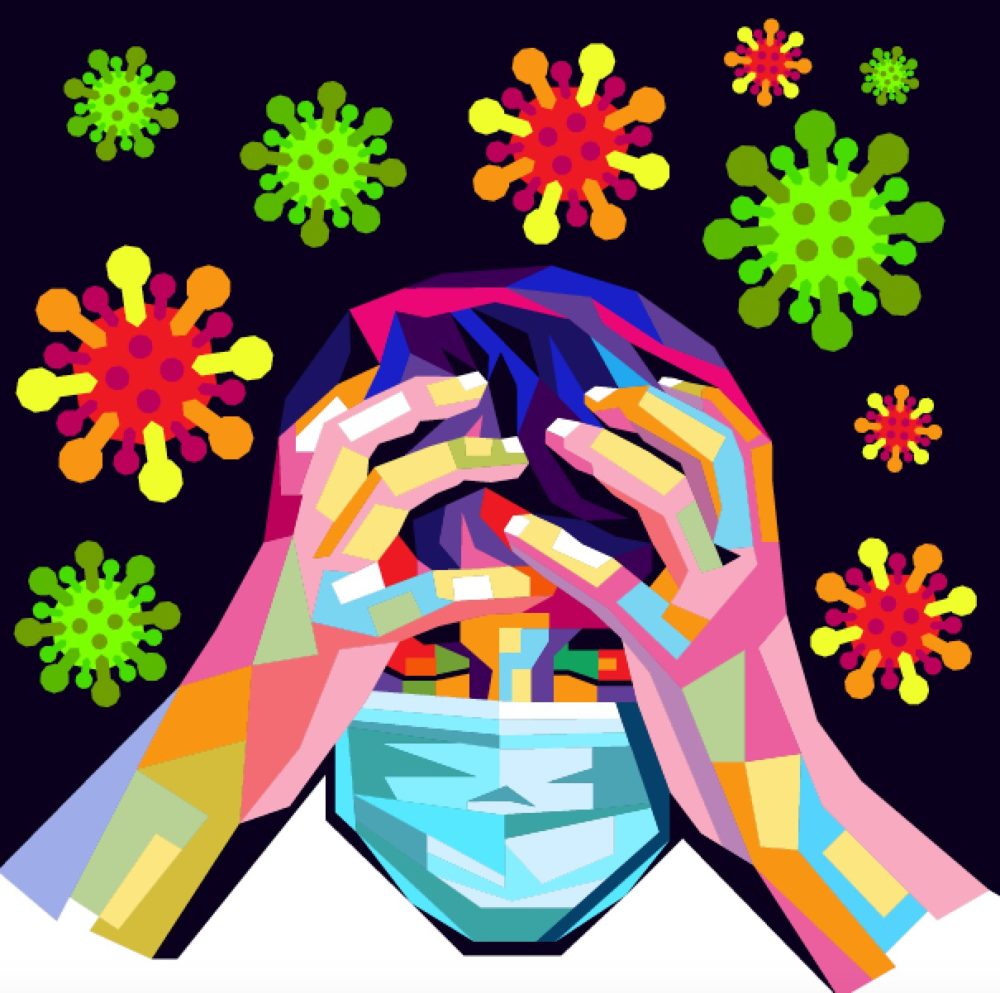Although it’s essential to our well-being, our mental health can rather be easy to neglect nowadays. Even if we don’t want to neglect it, we may not know what to do exactly to properly care for it. It’s not like we can safely go to a therapy session, COVID-19 has made that dangerous as well. And what expectations, if any, should we have about our mental health in those troubling times? Could the uncertainty of where our world is going, the inability to travel care-free, the financial crises surrounding us and affecting us personally and the abrupt long-term withdrawal from our normal social lives be traumatic or harmful enough to put our mental health at jeopardy? If so, is online therapy the answer to our increased mental health needs and staying both safe and sane? We talked to an expert, Dr. Anne Justus — a clinical psychologist who has resided and worked in Egypt since 2007 — to find out more about the limitations of therapy’s digital equivalent.
Dr. Anne Justus is an American Clinical Psychologist who is currently the Director of the Maadi Psychology Center – New Cairo branch. She was an Associate Professor of Practice at the American University in Cairo’s Department of Psychology. She obtained her doctorate in Clinical Psychology at the University of Rochester in New York and is a member of the American Psychological Association.

According to Justus, it only makes sense for our mental health needs to increase now. “Many people are experiencing anxiety, stress, and panic levels they have never experienced before. This is different than other crises we’ve dealt with in Egypt over the past 15 years,” said Justus.
“With COVID-19, however, there’s really nowhere to easily go or escape to yet. This is increasing anxiety dramatically.”
“During the political changes that took place in the country starting back in 2011, for example, many people who were capable of travelling somewhere safe felt relief in the idea that they could leave the country for a period of time if they felt in danger. With COVID-19, however, there’s really nowhere to go to escape the new reality… This is increasing anxiety dramatically. We are all in this together,” she added, clarifying why she thinks psychotherapy in general is currently more essential than ever.
Justus then took us through the perks and challenges that arise when using online therapy instead of physical face-to-face sessions from her perspective and experience…
Read more: ‘Psychologist Anne Justus on Toxic Masculinity in the Workplace and Striking a Work-Life Balance’
To What Extent Is Online Therapy Helpful?

Online Therapy Is Incredibly Helpful and Expands Access to Mental Health Services
“I have been using it [online therapy] for about 3 years in my practice as a supplement to in-person therapy. It is incredibly helpful in many situations, including when clients cannot come to the office due to travel restrictions, restrictive commuting times, illness, or living in parts of the world where therapy is not readily available. We are using it now in response to the COVID-19 situation,” said Justus whose therapy portal now reads “…due to COVID-19, all sessions will be online or via telephone. If your condition *requires* an in-person session, please message Dr. Anne Justus directly…”
It Can Be a Great Relief, Especially to Those Self–Isolating
To Justus, all of these above factors put together make online therapy one of the best tools we’ve got right now to maintain our mental health while staying safe. “Especially for individuals who are truly self-isolating (and not just socially distancing) because of the COVID-19 situation, online therapy can be a great relief.”
You can Give Your Psychotherapist a Virtual Home Tour
“One huge pro for online sessions is that, if the client chooses, they can take me on a “tour” of their home,” she added. “It’s like a home visit without me leaving my office. It can be helpful to see the physical area in which our client lives and interacts daily. I have met many of my clients’ pets this way, it is lovely!”
Why Is Online Therapy Good but Not Perfect?

Apart from the negative impact of a bad internet connection being one of limitations that any of us can guess easily, what other limitations does Justus think online therapy sessions have? What do physical face-to-face meetings have that online therapy doesn’t?
Emotional Connection, Body Language and Client-Therapist Dynamics
“Meeting in person generally allows for more emotional connection and allows the therapist more opportunities to read the clients’ body language and examine the dynamics between the client and therapist in real time. This is especially important in child, couples, and family therapy,” said Justus.
“Some clients even choose to sit in their parked cars alone to get some privacy during their session.”
Having a Safe Space can be Tricky Outside of the Therapist’s Office
Moreover, Justus believes that her office could provide a “safe space” for her clients, something they might not find easily otherwise. Without this space, some people won’t open up. They may be afraid of becoming vulnerable. “For people to make great strides in therapy, they must be able to feel safe to experience some emotional vulnerability. One consistent problem I see with online therapy (especially during this age of encouraged social distancing and isolation) is clients struggling to find a place in their home where they can go to have an uninterrupted session,” clarified Justus.
“Many clients come to therapy to discuss family issues. When they are stuck at home with the family, they don’t have as much freedom to speak openly. They are often concerned someone will walk into their room or overhear their therapy session. Some clients even choose to sit in their parked cars alone to get some privacy during their session. This is working surprisingly well.”
Not all Methods are as Effective When Translated Online
Not all therapies translate well to online application, according to Justus. She gave an example of a treatment called Eye Movement Desensitization and Reprocessing (EMDR) that’s quite effective in her experience for all types of trauma. “The method I prefer to use for this treatment must be done in person.”
It Might Not Feel Safe to Use the Internet
“Occasionally, with extreme stress and anxiety, some clients develop a sense of paranoia about using the internet to discuss personal matters. For these clients online therapy is not a match.” said Justus. “If we switch to 100% online therapy for a prolonged period, this portion of the population, and all of those who do not have devices to do voice/video calls, will not receive mental health services,” she emphasized.
“The mothers are working online during the day and, because of gendered societal expectations, are also expected to be home schooling their children during the day. The mental load has doubled for them, they have no personal time. The stress and expectations can be crippling.”
The Significance of Leaving Home and the Effect on Working Mothers
Justus believes that, for some people, in-person mental health care appointments are the only opportunity in the week to leave their homes and to have interactions with people outside of their family. A sharp increase in time spent indoors and with family seems to be related to an increase in demand for mental health support, according to the mental health professional. “Most critically, I have been seeing this a lot, particularly with working mothers who are now home schooling their children. These mothers are working online or in a physical office during the day and, because of gendered societal expectations, they are often also expected to be home-schooling their children during the day. The mental load has doubled for them, they have no personal time. The stress and expectations can be crippling,” she clarified.
Read more: ‘As Told by Dr. Anne Justus: Mommy Guilt for Mother’s Day’
From a Psychologist’s Point of View…
“It’s awful when you have a client who is about to open up about something that is very difficult for them to share and then you lose internet connection…”
What about the point of view of the psychologist? We had to ask Justus how she feels about online therapy herself, as a working professional. From the psychologist’s side, Justus told us, “doing online sessions is harder and less fruitful than in-person sessions.” She asserted, however, that “it’s definitely better than no therapy at all. Online sessions seem to work best with clients that I have previously seen in the office, not just online.”
In the wake of the digital transformation, the pandemic has made it clear that we urgently need fast and reliable internet in Egypt. It would increase the efficacy of online therapy sessions. Justus sees this as a big stumbling block. “This is not only irritating, but it breaks the flow of the interaction [between her and her clients]. It’s awful when you have a client who is about to open up about something that is very difficult for them to share and then you lose internet connection…”
Justus’ specialties include the treatment of depression, anxiety, stress, adjustment, personality disorders (including Borderline Personality Disorder, cutting and self-injurious behaviors) and sexuality and relationship intimacy. You can find her official public page on Instagram here, or head to her center’s website to learn more about her and schedule an appointment if you wish.




























